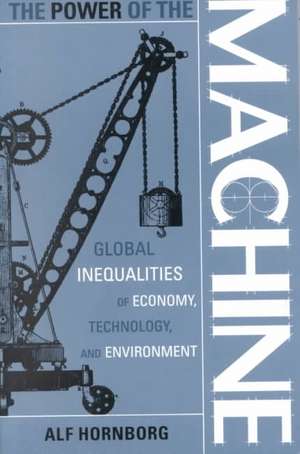The Power of the Machine: Globalization and the Environment
Autor Alf Hornborgen Limba Engleză Paperback – 8 oct 2001
Preț: 341.71 lei
Nou
Puncte Express: 513
Preț estimativ în valută:
65.38€ • 68.27$ • 54.12£
65.38€ • 68.27$ • 54.12£
Carte disponibilă
Livrare economică 14-28 martie
Livrare express 28 februarie-06 martie pentru 34.96 lei
Preluare comenzi: 021 569.72.76
Specificații
ISBN-13: 9780759100671
ISBN-10: 0759100675
Pagini: 264
Ilustrații: bibliography, index
Dimensiuni: 153 x 227 x 18 mm
Greutate: 0.45 kg
Ediția:0264
Editura: Rowman & Littlefield
Seria Globalization and the Environment
ISBN-10: 0759100675
Pagini: 264
Ilustrații: bibliography, index
Dimensiuni: 153 x 227 x 18 mm
Greutate: 0.45 kg
Ediția:0264
Editura: Rowman & Littlefield
Seria Globalization and the Environment
Cuprins
Chapter 1 Preface Chapter 2 Introduction: The Machine as Emperor Part 3 Part 1: Technology and Unequal Exchange Chapter 4 Chapter 1: Technology and Economics: The Interfusion of the Social and the Material Chapter 5 Chapter 2: Cornucopia or Zero-Sum Game: The Epistemology of Sustainability Chapter 6 Chapter 3: The Thermodynamics of Imperialism: Towards an Ecological Theory of Unequal Exchange Chapter 7 Chapter 4: Ecosystems, World Systems, and Environmental Justice Chapter 8 Chapter 5: Conceptualizing Accumulation from Spondylus Shells to Fossil Fuels Chapter 9 Chapter 6: Use Value, Energy, and the Image of Unlimited Good Chapter 10 Chapter 7: Language and the Material: Probing our Categories Chapter 11 Chapter 8: Symbolic Technologies: Machines and the Marxian Notion of Fetishism Part 12 Part 2: Money, Modernity and Personhood Chapter 13 Chapter 9: Money, Reflexivity, and the Semiotics of Modernity Chapter 14 Chapter 10: Ecology as Semiotics: A Contextualist Manifesto Chapter 15 Chapter 11: Exchange, Personhood, and Human Ecology Chapter 16 Chapter 12: The Abstraction of Discourse and Identity: A Case Study Chapter 17 Afterword: Culture, Modernity, and Power: The Relevance of Anthropology Chapter 18 References Chapter 19 Index
Notă biografică
Descriere
Argues that we are caught in a collective illusion about the nature of modern technology that prevents us from imagining solutions to our economic and environmental crises other than technocratic fixes.



























